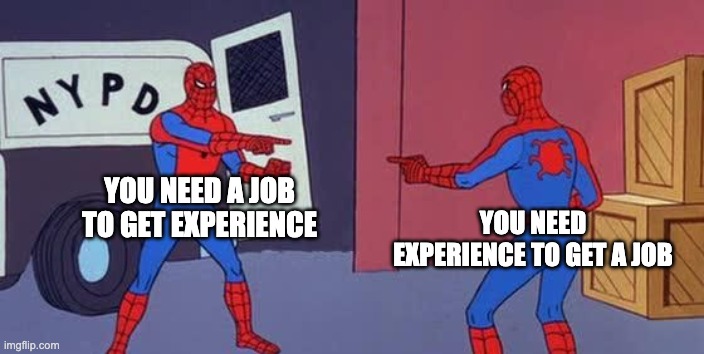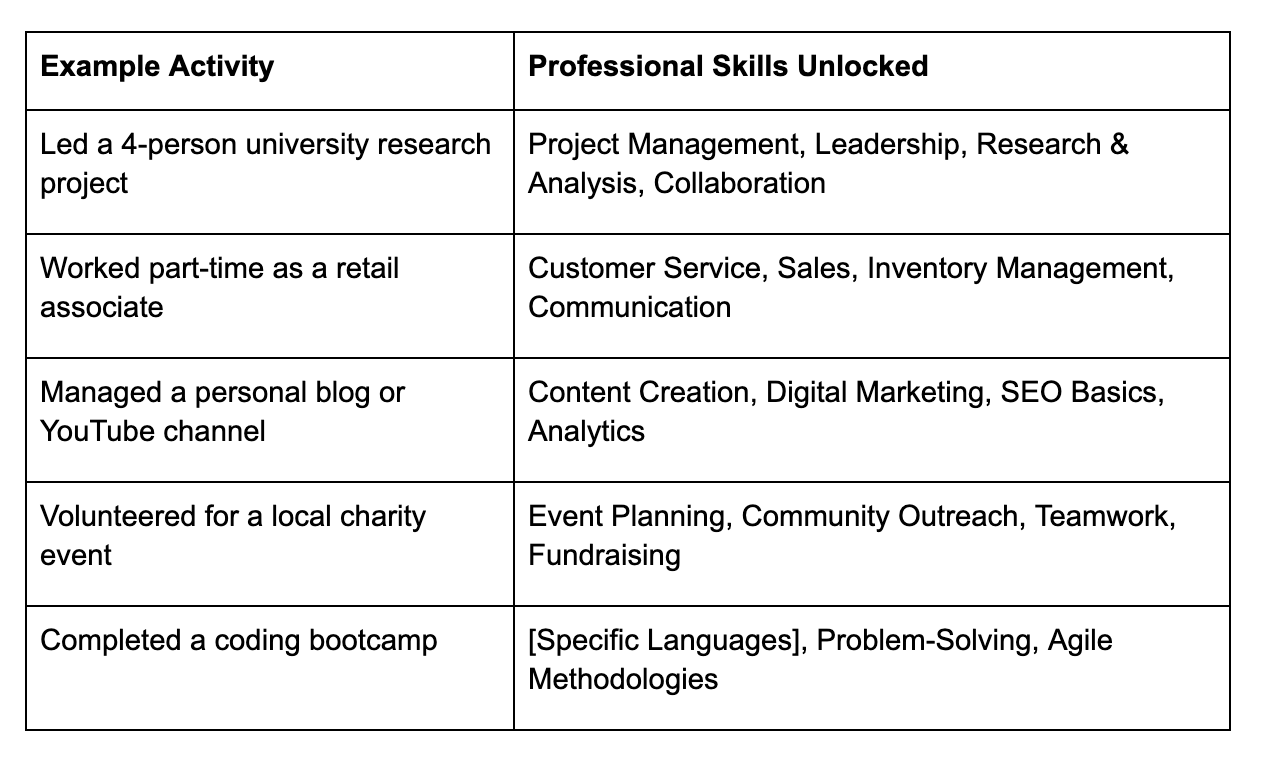How to Land a Job with No Experience: A Step-by-Step Guide
by Patrick Da Costa Guimarais • Last Updated 7/24/2025

It’s the most frustrating paradox in the professional world: you need a job to get experience, but you need experience to get a job. For new graduates and career starters in the summer of 2025, this challenge can feel like an impossible wall to climb. Looking at job descriptions that demand 2-3 years of experience for an "entry-level" role can leave you feeling defeated before you even start.
Let's get one thing straight: You are not unqualified. You are untested. There's a world of difference. Your perceived lack of "professional work experience" is not a weakness; it's a blank slate of pure potential.
Companies don't hire new grads for what they've done; they hire them for what they can do. This guide will provide a concrete, step-by-step roadmap to translate your potential into a compelling story that gets you hired.
The Mindset Shift - From "Unqualified" to "High-Potential"
First, we need to redefine "experience." Experience is not just a list of past job titles. It's the practical application of skills. You have been building valuable, marketable skills for years through your education, part-time jobs, and even your passions.
That group project you led for your final presentation? That's project management, collaboration, and leadership.
That part-time barista job you worked? That's customer service, point-of-sale operations, and time management under pressure.
That personal website you built or social media account you grew? That's digital literacy, content strategy, and self-motivated learning.
Your task is not to get experience out of thin air; it is to uncover the experience you already have and present it in the language that employers understand.
The Step-by-Step Action Plan
Step 1: Uncover Your Hidden Experience (The Skills Inventory)
Before you write a single word on your resume, take an inventory. Grab a notebook and list every significant project, part-time job, volunteer role, or leadership position you've had in the last four years. Now, translate those activities into professional skills.

This inventory is now the raw material for your resume. It is your proof of capability.
Step 2: Re-Engineer Your Resume for Potential
A traditional, chronological resume won't work for you. You need to build a skills-based resume that puts your capabilities front and center.
Lead with a Powerful "Profile Summary": Don't use an "Objective." Instead, write a 3-4 line summary at the top that highlights your academic background, key skills, and career ambitions.
- Example: "A recent summa cum laude graduate with a B.S. in Marketing from the University of Illinois. Possess strong foundational skills in data analysis, content strategy, and SEO, gained through rigorous academic projects and a personal digital portfolio. Eager to apply a strong work ethic and a passion for data-driven results to an entry-level marketing role."
Create a "Projects" or "Relevant Experience" or “Core Competencies” Section: This is your most important section. Detail 2-3 of your most impressive academic or personal projects. Describe them like you would a job, using bullet points and action verbs.
Example: "Market Research Project - Fictional Coffee Co."
Conducted a competitive analysis of 5 local coffee shops to identify market gaps and opportunities, presenting findings in a 20-page strategic report.
Developed a mock marketing plan that projected a 15% increase in foot traffic through a targeted social media campaign.
Quantify Everything: Numbers add weight and credibility. Instead of "Wrote a long paper," say "Authored a 25-page research paper on [Topic], earning a 98% grade."
Step 3: Target the Right Jobs
Stop applying for roles that ask for "3-5 years of experience." You are setting yourself up for rejection and burnout. Instead, focus your search on true entry-level positions. Use these keywords in your job search:
"Associate"
"Junior"
"Coordinator"
"Entry-Level"
"New Grad Program"
"Rotational Program"
"Apprentice"
These are roles where companies fully expect to train and mentor the person they hire.
Step 4: Network to Create Your Own Door
When your resume is light on experience, a personal connection is your most powerful asset. Networking isn't about asking for a job; it's about asking for advice.
Use Your Alumni Network: LinkedIn's Alumni tool is your best friend. Find people who graduated from your school and work at companies you admire.
Send a Simple, Respectful Message:
- Example: "Hi [Name], I see you're a fellow [Your University Mascot]! I'm a recent graduate with a degree in [Your Degree] and am exploring a career in [Their Industry]. I'm so impressed by your work at [Their Company]. Would you be open to a brief 15-minute virtual chat in the coming weeks? I'd love to hear about your experience."
One warm introduction from a network contact is worth more than 100 cold applications.
Step 5: Ace the Interview by Selling Your Potential
In an entry-level interview, they are hiring for attitude and aptitude. They want to know: Are you smart? Are you eager to learn? Are you a hard worker?
Use the S.T.A.R. Method with Your Projects: When they ask, "Tell me about a time you faced a challenge," use an example from your Skills Inventory.
Situation: "In my final year, I was leading a group project where one member wasn't contributing."
Task: "My task was to get the project back on track without creating conflict."
Action: "I scheduled a one-on-one meeting, listened to their concerns, and we redistributed the workload based on their strengths."
Result: "As a result, the team member re-engaged, and we delivered the project on time, earning an A grade."
Show Your Hunger: End the interview by explicitly stating your enthusiasm. "I know I have a lot to learn, and I'm excited to do it here. My goal is to absorb as much as I can and start contributing to the team as quickly as possible."
Your Career Starts Now
"No experience" is not a roadblock; it's simply your starting point. The key is to stop thinking about what you haven't done and start articulating what you can do. By uncovering your skills, re-engineering your resume, and selling your potential, you can and will land a fantastic job.
This process of translating your skills and tailoring your story for every single application is critical. It's also the most time-consuming part of the search.
That's why LifeShack is such a powerful tool for new grads. Our platform helps you build and save different versions of your experience, automating the customization process so you can auto-apply to entry level jobs roles, faster. We handle the repetitive work so you can focus your energy on networking and preparing to ace the interview.